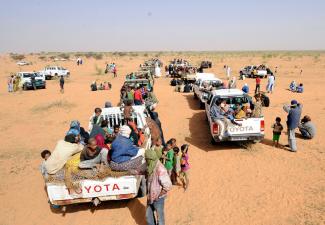Refugees
Last exit

Diarra was deported from Angola in 1996. Today, he organises people in Mali who were expelled from African countries and Europe. He knows the dramatic impacts deportation has on migrants, because he meets affected people every day. Often, entire families and neighbours pool to enable someone to flee to Europe. Accordingly, the refugees are under enormous pressure to find work and repay their debts. Those who are deported, however, return to their communities traumatised and desperate.
Ousmane Diarra knows cases of migrants who came home only to be disowned by their families or abandoned by their wives. The reason was that they had failed to bring about prosperity. Sometimes, extended families split in acrimony, when someone’s personal failure is blamed on inadequate upbringing.
While refugees and migrants are currently making front-page news, the phenomenon itself is nothing new. EU policies have had a bearing of refugees’ fates for many years. When the Cotonou Agreement took force in 2002, one consequence was a wave of mass deportation from Europe, as Diarra recalls. This trade agreement between the EU and the ACP, a group of former colonies of EU countries in Africa, the Caribbean and Pacific, includes a clause on “readmission”, according to which ACP governments must take in citizens of their own countries as well as those who travelled through it if they are arrested in another country as illegal aliens. Diarra says that masses of people from West Africa were forced to return home at the time, especially from France and Spain.
To help deported people to re-integrate in society, the EU has established the Centre for Information and Management of Migration (CIGEM) in Mali’s capital city, Bamako, in 2008. Many refugee organisations express criticism of this institution however. They say that CIGEM serves to control people’s movements and, to the extent possible, prevent migration. Diarra asks: “Who tells us that CIGEM was not set up to report persons who plan to migrate to European authorities and alert Frontex, the EU border-control agency?” CIGEM has so far received funding worth about € 10 million from the EU, Diarra says, and the centre is now being run by Mali’s government. The activist claims that a similar centre is established in Niger. The security situation in Mali is still fragile. In early 2012, Mali’s military clashed with Islamist forces and Tuareg insurgents.
Land grabbing is another issue that affects Mali. Because of EU subsidies for bio fuels, for example, vast monocultures are being cultivated on land that used to be used by small-holder farmers and nomads. Part of the problem is western investments in agriculture. Land grabbing concerns many countries, and some experts warn that up to 100 million helpless people may be driven from their traditional lands in the next couple of years .
In this context, some civil-society activists want to expose in public the performance of individual companies. Thomas Gebauer, the chief executive of medico international, a humanitarian civil-society organisation based in Germany, disagrees with this approach. He stated at a recent panel discussion in Frankfurt that it is mostly well known who the profiteers are anyway. What is needed, in his eyes, is a non-imperialist lifestyle of solidarity, with a focus on the public good rather than economic growth. According to Gebauer, destructive practices promoted by the EU must be discontinued all over the world. Ousmane Diarra agrees that global approaches are needed: “To find solutions, we must all work together.”
Jana Jagalski







